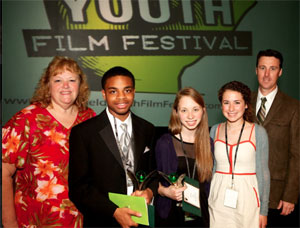Honoring our filmmakers: If you give a kid a camera

It’s not Hollywood, New York, or Cannes, but for a particular group of students, this red carpet will be unforgettable.
This time of year we traditionally award students who over the year score the highest on their exams, attend class every day, participate the most in school activities, achieve glory on the field or court.
We don’t always get a chance to recognize the kids behind the camera–our best storyboarders, screenwriters, special effect magicians, editors–our best storytellers.
For the fourth year, I had the honor of attending the Greenfield Youth Film Festival. The regional event, held at our local Keswick Theater, recognizes the talents of student filmmakers.
The Greenfield Youth Film Festival provides talented kids with real audience beyond our own website, where they are judged by university film professors and real film professionals.
Our digital storytellers did especially well this year. In fact, first place for Documentary went to Springfield Sophomore, Maurice Rippel. Meghan Smith won third place in the Narrative category.
They were all winners. Their creative spirits could never be captured or assessed or shared by a bubble test.
Tools and ideas to transform education. Sign up below.
I asked our Springfield Township High School Quest Class and their teachers what they learned along the way.
(With apologies to Laura Joffe Numeroff)
If you give a kid a camera, it can be unpredictable . . .
- She will want to film her swim team and make a mockumentary about them and the ridiculous things that they do. (Rachel)
- She will be indecisive about the decision to make her film about indecisiveness. (Tori)
- His cameraman will drop it while trying to attach it to the tripod. (Danny)
- She won’t know what to do with it because she hasn’t had a video production class in two years (Victoria)
- She’ll try to figure out how to find blooming flowers in the middle of February. Tulips and daffodils will be her new best friends. (Abby)
The Secret Life of Beekeepers from Spartan TV on Vimeo.
If you give a kid a deadline. . .
- He’ll write a schedule to plan out every day and hour of filming. (Nick)
- He’ll come into school at night, missing American Idol in the process, to make it. (Maurice)
- Her talent will fail her and she will film one week before it’s due. (Michelle)
- She will be so excited about the project that she will finish it early and people will get mad at her. (Tori)
- He will start to cut scenes from his film in order to fit the deadline and end up having a very interpretive movie.(Justin)
Class Warfare
Class Warfare from Spartan TV on Vimeo.
If you give a kid a camera . . .
She will run away with the circus. (Michelle)
Cirque
If you tell the kid that sound is everything in film making . . .
- He will regret his background music choices. (Yael)
- She will avoid the problem, get rid of dialogue, and just find a really good track. (Nadira)
- He’ll go through a whole day of filming before realizing the that microphone’s batteries are dead. (Danny)
- She will fill her movie with bagpipes. (Allie)
Scottish Spirit
If you tell a kid the film should have personal meaning . . .
He’ll relive his personal anxiety about essay deadlines and disappointing teachers. (Danny)
Before the Bell
If you give a kid creative freedom . . .
- He’ll recruit four teachers to sing, some better than others. (Nick)
- She will find an artistic vision and run with it. (Michelle)
- She will make her family play ridiculous roles (Sarah)
- She’ll love it (Victoria)
- She will have so many fun ideas and be so excited to do them all, then realize that none of them are really possible. Then, she will freak out because she can’t find an idea that is fun and feasible, so she will end up doing a film about something that is so far away from her original ideas. (Tori)
Arbitration
If you give a girl a camera, she will want to film something she knows about, her own swim team . . .
Seeing that most of her footage will be of a pool, she’ll probably take a very long time trying to figure out what shots are of what, and this will most likely frustrate her. (Rachel)
Supa Spartan Swim Team
If you make a kid make a storyboard . . .
- All twenty pages of it will be accidentally thrown away by a rogue janitor. (Billy)
- She will become an expert at drawing stick figures in less than 5 seconds. (Rachel)
- He won’t be happy. While shooting he will see better shots than he originally pictured, be told he cannot capture two camera angles because his teachers refuse to sing twice, and as a consequence, the storyboard may fall to pieces. (Nick)
Bach to School
If you tell a kid to treat her actors with respect . . .
She will make her family play ridiculous roles. She then will boss them around for an entire day until she gets all of the film she needs. And when it is all over she will realize how patient they were and be forever grateful. (Sarah)
If you tell the kids to ask their friends to act . . .
- Nothing will get done and he will have to cast himself. (Billy)
- The friend will repeat his lines over and over again without mercy only to forget the line when the camera is rolling.(Justin)
- They’ll be totally cool with it, but getting a fish to act will be difficult. (Victoria)
Benoit et Moi
If you tell a kid to tell a story . . .
- She will ignore you and make a documentary instead. (Allie)
- She will realize that people’s everyday life is a story and wonder how to tell it in a film. (Nadira)
- He will strive to appeal to the audience, and in doing so, will learn to tell a story that is meaningful to him. (Danny)
- He will document history in a creative manner. While filming he will learn the importance of having solid acting and also the importance of good sound and sharp editing. (Billy)
Die Teilung
If you give a kid a camera, he will imagine . . .
A magic skateboard. After some time, he will find out that it has the ability to change his clothes. He will get annoyed after having to film the same trick multiple times. The fact that one small change in the shot can ruin the whole scene will frustrate him. He will also learn to hate editing. (Yael)
Magic Skateboard
If you give a kid a camera, she will learn about planning . . .
If she doesn’t, she will run into planning issues, and then she will be angry that she didn’t pre-plan a plan (that she didn’t have). (Nadira)
86,400 Seconds
If you are the teacher giving those cameras to the kids. . .
You’ll learn quickly that projects like this are all about partnership. One teacher alone could not run this activity. You’ll learn with your students that the biggest thing is pre-production. Kids don’t initially realize how much time goes into thinking, writing, rewriting–how many drafts it takes to before they even pick up a camera. They are not usually ready for all the changes that happen during filming, during editing. They will want to move on and not respond all that well to sharing drafts and critiquing. That is, until they start hearing their scripts. And then a dialog will begin, and that will snowball into a conversation about storytelling. (Dan Meder, teacher)
If you take a kid to a film workshop . . .
- She’ll feel very intimidated when watching the previous year’s winning films and she’ll feel like she won’t be able to produce anything close to them (Victoria)
- She might think of her idea on the bus ride home, and keep that inspiration in the back of her mind. (Meghan)
Tokens
When I gave your kids some cameras . . .
(but not until screenplays were complete and critiqued) I found they became a family of constructive critics who supported each other beyond my wildest dreams. Students wrote and rewrote, up to eight drafts. They laughed and they cried as they lived each other’s projects. They were excited as they saw each script come to life in film. And I watched them celebrate together as winners were announced at the film festival. It was all a joy to witness. (Marlene Thornton, teacher)
If your student wins the big prize of the night for documentary . . .
He’ll think back on his process. He’ll be surprised and overcome with emotion when he learns that after all that, his film is award-worthy. And he’ll be glad he rented a tuxedo for the event. (Maurice)
Grown-up to Growing Up
If a kid gets to walk the red carpet . . .
- She’ll feel awkward and avoid pictures (Victoria)
- She will get very excited and successfully wear heels for the first time ever without actually falling down. (Rachel)
- She’ll decide that a purple carpet goes better with her dress. (Abby)
- He’ll go out, buy a snazzy suit, and wear it. (Nick)
- She will want to wear new shoes. (Meghan)
Meghan (3rd Place Narrative)
Maurice (1st Place Documentary)
As I watched all of these student productions, I thought about those takeaways myself.
As I wrote last year, preparing for events like Greenfield offers students opportunities to use their brains, their hearts, their voices, as well as the technological tools available to them to:
* imagine
* plan
* organize
* write
* syntesize
* create
* invent
* tell a story
* collaborate
* communicate
* invent
* share
* entertain
* contribute
* attempt to make a difference
While we are lucky that our region formally celebrates student creativity with an event like Greenfield, these types of celebrations are replicable. Our students regularly produce and share on YouTube, fan fiction sites, DeviantArt.
We can foster mainstream recognition of creativity and the celebration of student work within our school communities.
Joyce Valenza is the Teacher-Librarian at Springfield Township High School, author, and technology advocate. Read her SLJ NeverEndingSearch blog here.
